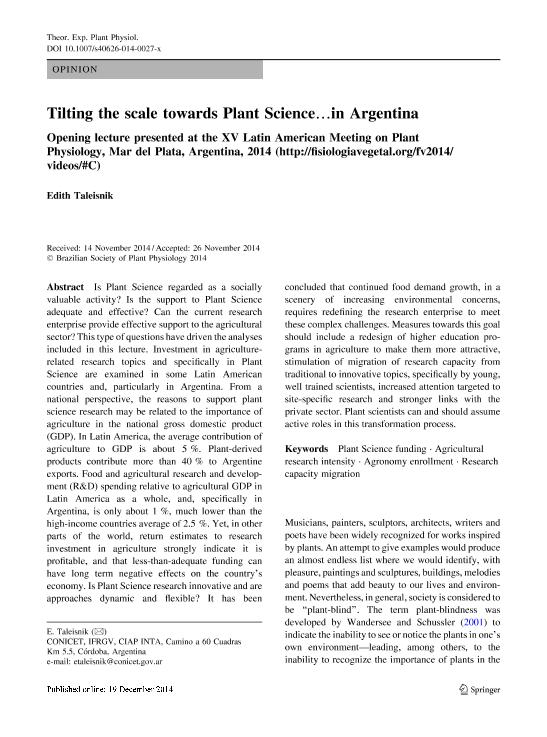Mostrar el registro sencillo del ítem
dc.contributor.author
Taleisnik, Edith

dc.date.available
2016-12-16T14:08:24Z
dc.date.issued
2014-12
dc.identifier.citation
Taleisnik, Edith; Tilting the scale towards Plant Science…in Argentina; Sociedade Brasileira de Fisiologia Vegetal; Brazilian Journal Of Plant Physiology; 27; 1; 12-2014; 1-15
dc.identifier.issn
1677-0420
dc.identifier.uri
http://hdl.handle.net/11336/9569
dc.description.abstract
Is Plant Science regarded as a socially valuable activity? Is the support to Plant Science adequate and effective? Can the current research enterprise provide effective support to the agricultural sector? This type of questions have driven the analyses included in this lecture. Investment in agriculturerelated research topics and specifically in Plant Science are examined in some Latin American countries and, particularly in Argentina. From a national perspective, the reasons to support plant science research may be related to the importance of agriculture in the national gross domestic product (GDP). In Latin America, the average contribution of agriculture to GDP is about 5 %. Plant-derived products contribute more than 40 % to Argentine exports. Food and agricultural research and development (R&D) spending relative to agricultural GDP in Latin America as a whole, and, specifically in Argentina, is only about 1 %, much lower than the high-income countries average of 2.5 %. Yet, in other parts of the world, return estimates to research investment in agriculture strongly indicate it is profitable, and that less-than-adequate funding can have long term negative effects on the country’s economy. Is Plant Science research innovative and are approaches dynamic and flexible? It has been concluded that continued food demand growth, in a scenery of increasing environmental concerns, requires redefining the research enterprise to meet these complex challenges. Measures towards this goal should include a redesign of higher education programs in agriculture to make them more attractive, stimulation of migration of research capacity from traditional to innovative topics, specifically by young, well trained scientists, increased attention targeted to site-specific research and stronger links with the private sector. Plant scientists can and should assume active roles in this transformation process.
dc.format
application/pdf
dc.language.iso
eng
dc.publisher
Sociedade Brasileira de Fisiologia Vegetal
dc.rights
info:eu-repo/semantics/openAccess
dc.rights.uri
https://creativecommons.org/licenses/by-nc-sa/2.5/ar/
dc.subject
Plant Science Funding
dc.subject
Agricultural Research Intensity
dc.subject
Agronomy Enrollment
dc.subject
Research Capacity Migration
dc.subject.classification
Agricultura

dc.subject.classification
Agricultura, Silvicultura y Pesca

dc.subject.classification
CIENCIAS AGRÍCOLAS

dc.title
Tilting the scale towards Plant Science…in Argentina
dc.type
info:eu-repo/semantics/article
dc.type
info:ar-repo/semantics/artículo
dc.type
info:eu-repo/semantics/publishedVersion
dc.date.updated
2016-12-15T14:15:04Z
dc.identifier.eissn
1677-9452
dc.journal.volume
27
dc.journal.number
1
dc.journal.pagination
1-15
dc.journal.pais
Brasil

dc.description.fil
Fil: Taleisnik, Edith. Consejo Nacional de Investigaciones Científicas y Técnicas; Argentina. Instituto Nacional de Tecnologia Agropecuaria. Centro Nacional de Inv. Agropecuarias. Centro de Inv. Agropecuarias. Instituto de Fisiologia y Recursos Geneticos Vegetales; Argentina. Instituto Nacional de Tecnologia Agropecuaria. Centro Nacional de Investigaciones Agropecuarias. Centro de Investigaciones Agropecuarias; Argentina
dc.journal.title
Brazilian Journal Of Plant Physiology

dc.relation.alternativeid
info:eu-repo/semantics/altIdentifier/doi/http://dx.doi.org/10.1007/s40626-014-0027-x
dc.relation.alternativeid
info:eu-repo/semantics/altIdentifier/url/http://link.springer.com/article/10.1007/s40626-014-0027-x
Archivos asociados
